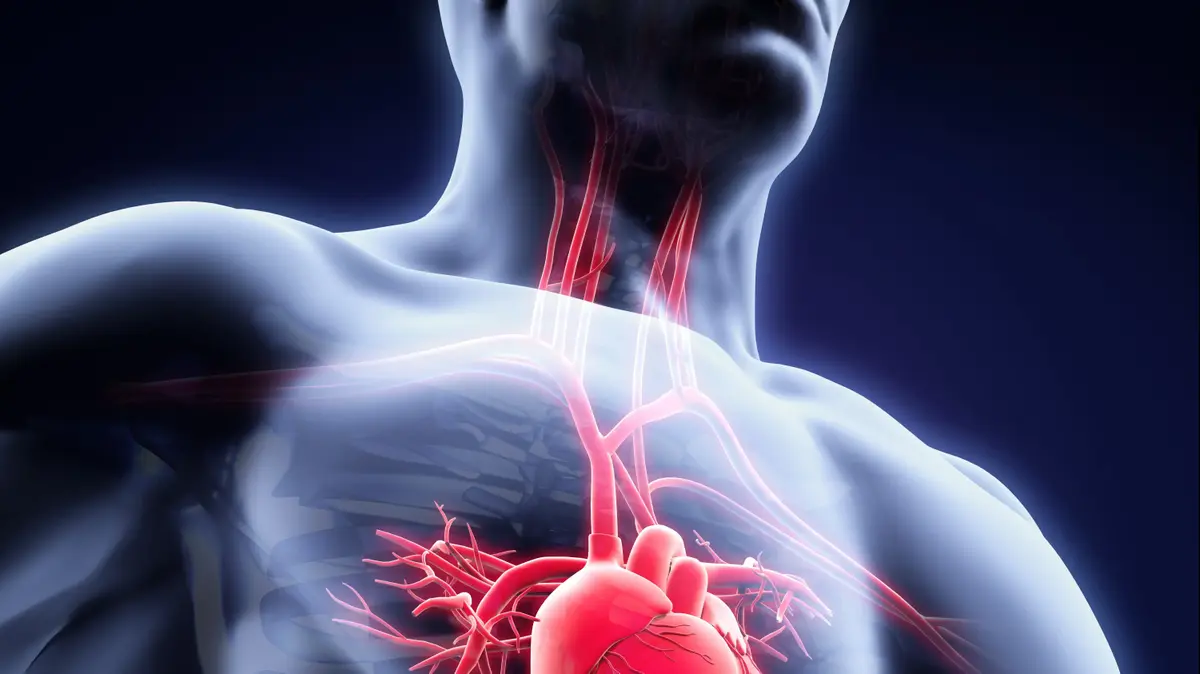Warns of the consequences of cardiac arrhythmias, especially atrial fibrillation: cardiologist Professor Alexander Leber from Munich's Isar Hospital. © Achim Frank Schmidt
Fast, irregular pulse can be a warning sign of cardiac arrhythmias. "A stroke is imminent," warns heart professor Alexander Leber.
Nightmare stroke: Every year, about 270,000 people in Germany suffer such a meltdown in the brain. The consequences are often dramatic. They range from permanent disability to death. This makes it all the more important to know the risk factors and to implement alarm signals in good time. This includes an often fast, irregular pulse. "Such symptoms may indicate cardiac arrhythmias. They are often the trigger for a stroke," explains Professor Alexander Leber, Director of Cardiology at Munich's Isar Hospital.
Blood clots can travel from the heart to the brain and cause a stroke there
"About one in three strokes is caused by cardiac arrhythmias," says Leber. More precisely, from atrial fibrillation, the most common cardiac arrhythmia. The tricky thing about it: "Atrial fibrillation in itself is harmless. But this cardiac arrhythmia can set off a dangerous chain reaction. This is because blood clots can form in the heart. These can then be easily swept into the brain with the blood flow and clog small veins there. As a result, brain cells die within a short period of time," explains Leber.
Cardiac arrhythmias: Blood-thinning drugs to protect against cerebral infarction
Cardiac arrhythmias can cause dangerous blood clots to form in the heart, which can be swept into the brain and cause a stroke. © ALFRED PASIEKA/Science Photo Liabry
The blood clots - called thrombi in technical jargon - form for the most part in the area of the left atrium, the so-called atrial appendage. "There, the blood flow is reduced during atrial fibrillation," explains Leber. "For this reason, patients with an increased risk of stroke in atrial fibrillation are usually prescribed blood-thinning medication." These include, for example, the classic drug Marcumar or modern follow-up preparations such as Xarelto, Pradaxa, Eliquis or Lixiana.
Heart professor Leber advises: Check your pulse regularly
When diagnosing atrial fibrillation, the doctor is dependent on the patient's help. "In order to detect atrial fibrillation in time, you should regularly palpate and check your pulse, for example on your wrist. If you often notice a kind of pulse racing, it is best to make an appointment with your family doctor or cardiologist and describe your experiences to him," advises heart specialist Leber. In many cases, a normal ECG does not provide any further information about atrial fibrillation because it is inconspicuous outside of these cardiac arrhythmias. For this reason, many doctors prescribe a long-term ECG if atrial fibrillation is suspected.
Normal heart rhythm is between 60 and 80 beats per minute
The normal heart rhythm is between 60 and 80 beats per minute. During physical or mental stress, the pulse rate increases because more blood has to be pumped through the circulation. "Due to various influencing factors such as alcohol or coffee, people without heart disease can also experience isolated extra beatings. These are mostly harmless. Almost all of us have experienced a heart stumbling at some point," Leber reports. "However, if there is damage to the conduction system of the heart, pathological arrhythmias can develop."
0
Also Read
More and more young people are suffering a heart attack: cardiologist explains why
READ
Lose weight in a healthy way: Ten foods that are better to eat raw
READ
"So well solved": Young mother shows on TikTok how she raises her child without scolding
READ
Dementia: Symptom in sleep announces it years earlier
READ
With Switchel against belly fat: Diet drink with apple cider vinegar should help to reduce belly fat
READ
Fancy a voyage of discovery?
My Area
Almost five percent of all people over the age of 64 are affected by atrial fibrillation
In atrial fibrillation, the atria are excited in a completely uncoordinated manner, and the blood flow in the atria is greatly reduced. "This disease affects almost five percent of all people over the age of 64," Leber said. "Initially, this flicker only occurs for a few minutes or hours, we doctors speak of episodes. Later, this condition can also persist permanently. The typical symptom is an arrhythmic and usually rapid pulse, which is often perceived as heart stumbling or palpitations."
High blood pressure and diseases of the heart valves are often the trigger
The most common causes of atrial fibrillation are, according to explanations of heart specialist liver, high blood pressure and diseases of the heart valves, which over time lead to overstretching and enlargement of the atria. "In addition, hyperthyroidism or sleep apnea can also trigger atrial fibrillation." The risk increases with age.
Good chances of recovery with an operation in the cardiac catheterization laboratory
However, there is a good chance of recovery. In addition to blood-thinning medication, so-called catheter ablation is also used. "During this procedure in the cardiac catheterization laboratory, the conduction fibers in the atrium that cause the fibrillation are obliterated with the help of high-frequency current or with cold or laser balloons. Nowadays, this form of therapy has a success rate of about 70 to 80 percent," says Leber.








